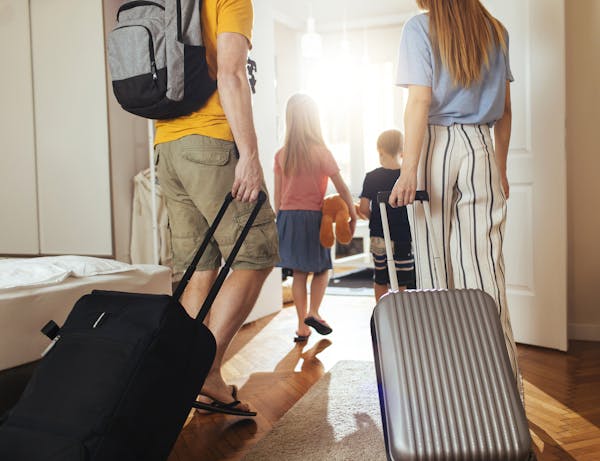Amanda and Peter VanOverbeke of Orono planned to jet off to Ireland with their two sons, Danny, 18, and Andrew, 16. The summer vacation was to be a present for Danny, who just graduated from Orono High School, and a celebration of his acceptance to Notre Dame — home of the Fighting Irish. Now, given the coronavirus pandemic, they will instead drive to a rental house on Lake Michigan for some family togetherness before taking Danny to school.
The Van Overbekes are shifting gears, from Europe by air to the United States by car, reflecting the altered reality of many other travelers.
Like no summer before, this is the summer of the road trip.
Gas prices have plunged. Unemployment has jumped, bringing an uncertainty that can quash grand vacation plans. The pandemic has scared fliers away from once-crowded planes and grounded more than half of the U.S. airline fleet. People are tired of their homes, where they have been isolating — and dreaming of escapes.
This unprecedented confluence of circumstances has accentuated Americans' long love affair with the open road.
In a survey of 1,000 Americans, more than half said they planned to visit family or friends in the U.S. this summer — and 73% of them will do so by car, according to a study by tourism research firm Longwoods International. Likewise, GasBuddy found that one-third of Americans plan to hit the road this summer. In a FinanceBuzz survey of 1,500 Americans, 48% said they plan to skip flying for at least a year. Meanwhile, True Incentive, a company that sells marketing and sales reward trips to businesses, is offering a "great American road trip" with hotel nights in the continental U.S. as clients shift away from the usual cruises and flying vacations.
At AAA Minneapolis, requests for TripTiks — printed guides and maps for driving vacations — tumbled in April and May, said Linda Snyder, vice president of travel and retail services. But in the first few days of June, numbers are nearly on par with the same period last year. Glacier and Yellowstone national parks, the Black Hills, Southern California and the Carolinas dominate the requests.
No hotel required
Whether it is because of the romance of roaming or a wariness of hotels, increasing numbers of travelers are looking to recreational vehicles for their getaways.
Vistabule Teardrop Trailer, a St. Paul company that makes and sells custom-built camper trailers, has seen a surge of interest. "The sense of urgency that is sometimes there is much more elevated," said Steve Corcoran, general manager. The turnaround time on an order can be as much as five months for the luxury trailers, whose $20,000 base model can be upgraded with solar panels, refrigerators, heating, air conditioning, and other options. Inquiries have more than doubled from pre-COVID levels, and orders were up 38% in May compared with the same time last year. Some customers are asking if they can buy a floor model for a quick purchase, Corcoran said.
In May, RVshare, a peer-to-peer recreational vehicle marketplace akin to Airbnb, saw its highest booking numbers in the company's eight-year history. The service recently added a filter so consumers can search for RV rentals with flexible cancellation policies, which can ease worries about a sudden case of COVID-19 stopping a vacation in its tracks.
Before you head out
For people traveling by car instead of plane because they want to limit interactions with people, a few steps should help keep you healthy on the road. To avoid a surprise visit to a mechanic, get your car checked before you head out. Sanitize the interior of your car as you would your home after it's finished at the shop. Pack masks, hand sanitizer, disinfectant wipes, soap and paper towels. Bring along a cooler to fill with drinks and snacks to limit your stops.
Knowing of any restrictions and quarantines in place for your destinations will also be key. AAA has a map of the country with that information at tinyurl.com/yccjkero.
VanOverbeke said that she feels comfortable with her drive across Wisconsin to the lake house and then on to Notre Dame, in Indiana.
"We have our protocols down pat: masks, wipes, what we can touch and not touch," she said.

Want to share info with the Star Tribune? How to do it securely

'Safe recovery sites' would offer syringes, naloxone and more to people using drugs. The plan could be in peril.
New Minnesota GOP leaders seek peace with party's anti-establishment wing

Who is Republican Lisa Demuth, Minnesota's first House speaker of color?

